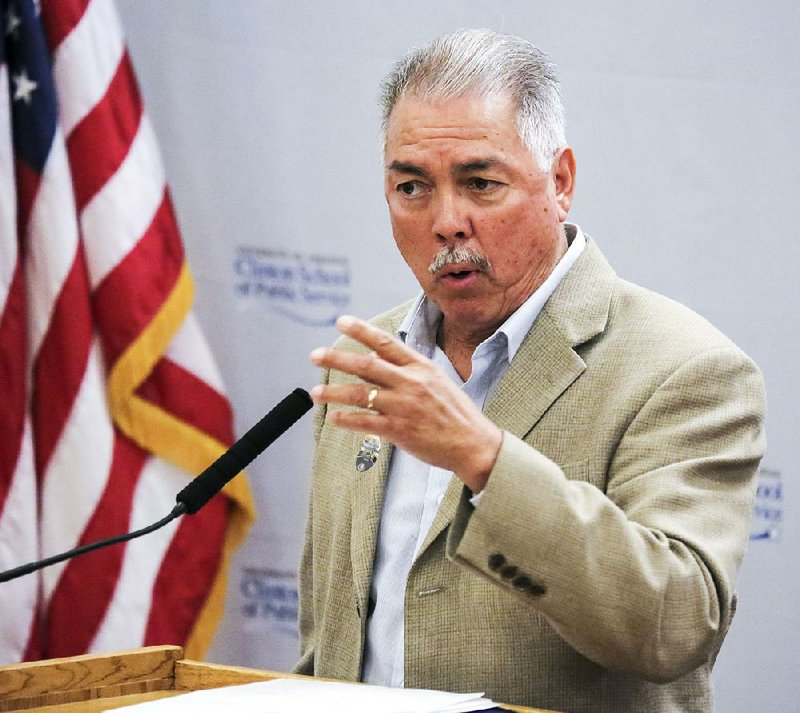Little Rock leaders are working to implement a program that would pull homeless people off the streets for a few hours a day and put them to work for the city.
On Wednesday, officials including City Manager Bruce Moore and Vice Mayor Kathy Webb met with Alan Armijo, who oversees a program called "There's a Better Way" in Albuquerque, N.M., to discuss how Little Rock could start a similar program.
Moore said Little Rock should have a proposal for a pilot program by year's end.
Armijo, who is director of constituent services, explained how Albuquerque's program operates during a lecture Wednesday at the University of Arkansas Clinton School of Public Service. The program was started in 2015 by Albuquerque's previous mayor. Every morning, a supervisor takes a van out to places frequented by the city's homeless population and asks one question: "You want to work?"
Participants are paid $9 an hour, cash, for tasks that include city beautification and garbage removal, mostly clearing weeds and litter, Armijo said. That is about the same rate Little Rock pays its temporary employees, according to Moore.
Through a partnership with a nonprofit, Albuquerque uses the work program to connect the homeless with mental-health, substance-abuse and employment services.
"There is dignity in work, and there is giving people that opportunity," Webb said. "Why wouldn't you want to have a cleaner city, and you can help somebody while you're doing it? It's a win-win."
Other cities, including Tulsa and Fort Worth have started similar programs.
Armijo said he would recommend that any city start with a pilot program, operating two days a week for six months, to see how it goes and then tweak it later.
"I think it's realistic for any city," he said. "I think they have to take what we did and see how it works for their city."
Armijo added that the program is not a blanket solution for homelessness or panhandling; it's just one way to help people in need. It doesn't address homeless people who have physical disabilities, or get "professional" panhandlers who don't want to work off the streets.
A January 2017 census by the Central Arkansas Team Care for the Homeless counted 990 homeless people in the Little Rock metropolitan area.
The Albuquerque program has provided work for 1,800 people over three years, Armijo said. Of those, 355 have engaged in mental health or substance abuse services and 76 have found permanent employment, most in landscaping and construction jobs, he said.
Moore said he looks forward to implementing a pilot program, which would likely have a budget between $50,000 and $60,000. He noted that a proposal before the end of the year, during the months the 2019 city budget is set, would be good timing.
Judy Thompson, who volunteers at Little Rock's Jericho Way Resource Center, estimated that about half of the chronically homeless people she works with want to earn money for themselves. It would be impossible for those people to work five consecutive days because of their mental-health issues or lack of transportation, Thompson said, so a program where someone can opt to work a few days each week would work well.
Two Hot Springs officials, Deputy City Manager Bill Burrough and City Director Karen Garcia, said they would also meet with Armijo in hopes of starting a similar program in the west-central Arkansas city of about 37,000.
Metro on 09/13/2018
